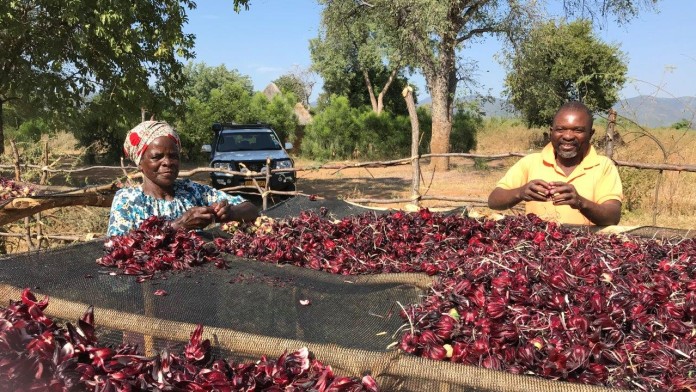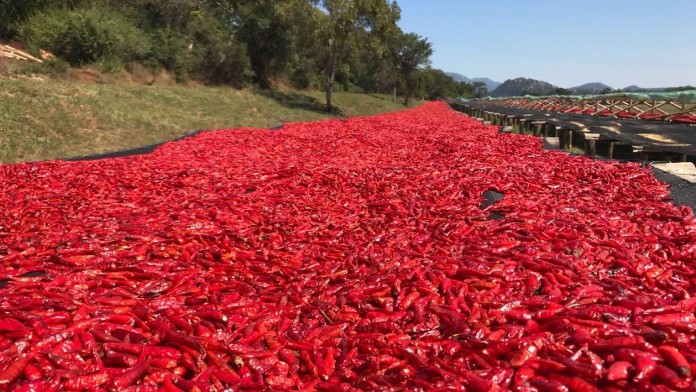News from 2018-11-27 / DEG, Sustainability
Zimbabwe: employment and future prospects in agriculture
On two tests farms in Zimbabwe the Martin Bauer Group is growing organic-quality plants that are suited to the regional climatic conditions. This is creating around 900 jobs and thousands of small farmers and wild plant gatherers are being trained.

The air is filled with aromas such as camomile, lemon balm, peppermint, aniseed and caraway. Bright red chilli peppers and hibiscus flowers lie on special pieces of kit to dry in the sun. A huge variety of herbs and spice plants are processed on the pilot farms of the Martin Bauer Group in Zimbabwe.
The German company specialising in fruit and herbal teas has been supporting a forward-looking project for about three years: in cooperation with the local partner company Organic Africa, the firm is running two pilot farms in climatically opposed regions. At the same time a comprehensive training infrastructure is being set up for ecological agriculture and wild plant gathering. In each case this consists of a training centre, a training farm and a processing facility. Here small farmers and wild plant gatherers learn how to produce, process and store high-quality herbs, medicinal and aromatic plants. In addition, the cultivation of vegetables for local consumption, such as maize, potatoes and beans, is tested and taught in order to improve the food situation in Zimbabwe.
Production of Fair Trade-certified herbs, spices, medicinal and aromatic plants on the two farms.
DEG is co-financing the project from funds of the develoPPP.de programme of the Federal Ministry for Economic Development and Cooperation (BMZ). Yet the collaboration goes far beyond that: “The staff of DEG have given us valuable support. Without their advice and local know-how, we would not have been able to cope with the difficult initial phase in Zimbabwe on our own,” states Alfred Zink, procurement manager, Martin Bauer.
About 40 per cent of the arable land on the farms is used for growing herbs, spices, medicinal and aromatic plants. The other 60 per cent is intended for cultivating food plants and for the natural process of hydrogen fixation via micro-organisms which keeps the soil fertile. The plan is to produce around 300 tons of organic and Fair Trade-certified herbs, spices, medicinal and aromatic plants on the two farms.

Thousands of small farmers and wild plant gatherers are being trained
In Zimbabwe a great deal of basic agricultural knowledge has been lost in recent years. At the same time climate change is making itself felt through alterations to the rainy and dry seasons. The agricultural training sessions are helping local farmers to produce climate-adapted foods for their own consumption and for the regional market. The training in herbal and spice plants ensures that the product quality meets international market requirements and that post-harvest losses are reduced. The introduction of specific forms of certification such as organic and Fair Trade make it easier to market beyond the regional level. Clear distribution structures and written contracts offer small farmers an opportunity to leave the informal sector and earn a reliable income.
The pilot phase still has another year to run. After that, the two demo farms are expected to be self-financing through their income from selling their harvest. As many as 400 permanent and 500 seasonal new jobs are thus being created on farms. As part of the project, 2500 small farmers, 500 contract farmers, 1000 wild plant gatherers and 400 farm labourers are receiving training. Around 70 per cent of those being trained are women. As rural households contain an average of seven family members, this means a total of around 30,000 people are benefiting from the project.

Share page
To share the content of this page with your network, click on one of the icons below.
Note on data protection: When you share content, your personal data is transferred to the selected network.
Data protection
Alternatively, you can also copy the short link: https://www.deginvest.de/s/endBZF67.B5hA
Copy link Link copied